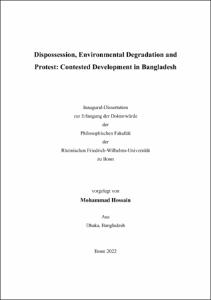Dispossession, Environmental Degradation and Protest: Contested Development in Bangladesh

Dispossession, Environmental Degradation and Protest: Contested Development in Bangladesh

| dc.contributor.advisor | Antweiler, Christoph | |
| dc.contributor.author | Hossain, Mohammad | |
| dc.date.accessioned | 2022-09-21T10:05:03Z | |
| dc.date.available | 2022-09-21T10:05:03Z | |
| dc.date.issued | 21.09.2022 | |
| dc.identifier.uri | https://hdl.handle.net/20.500.11811/10280 | |
| dc.description.abstract | Since 2009, the government of Bangladesh has planned to construct 22 coal-fired power plants. This initiative of the government has been contested by local people, environmental activists, and civil society members from different motivational perspectives. The overall objective of this research is to investigate the political contestations and negotiations of different actors around the construction of the Rampal and Banskhali coal-fired power plants. From the theoretical perspective of political ecology, this research characterises how different actors engage in this contestation from different interest-based motivations within the greater debate of ‘development’. Empirical information has been collected following the qualitative research method. A qualitative content analysis method has been applied for data analysis and the results of the research have been presented narratively.
The results of this research present a contesting position of the actors around the construction of these coal power plants. From the ‘developmentalist’ point of view, the government identified coal-fired electricity generation as the cheapest way to produce electricity in order to accelerate the country’s economic growth, rapid urbanisation, industrialisation, and overall development activities. From the ‘environmentalist’ point of view, on the other hand, the environmental activists and civil society members argue that electricity generation from burning coal compromises environmental protection, human rights, and social and environmental justice. Most importantly, the environmental activists are arguing against the Rampal Power Plant, which is located close to the Sundarbans mangrove forest, which is a UNESCO world heritage site. However, both the ‘developmentalist’ and ‘environmentalist’ perspectives fail to accommodate the interests of local people who have been evicted from their land and traditional way of living due to land acquisition. Vibrant protests have emerged against these power plants from the environmental activists and dispossessed population who were different in reasoning to join the protest and adopting protest strategies. Towards the environmental activists, the government offered technocratic solutions such as the use of advanced technology that would almost neutralise the environmental pollution that would occur from these coal power plants. Towards the protesters from the dispossessed population, the government reacted violently - some activists were killed, while others were physically assaulted, and also several fabricated cases were filed against them. Despite these protests, however, the government is still determined to construct the power plants according to the planned schedule. | en |
| dc.description.abstract | Seit 2009 plant die Regierung von Bangladesch auf Basis von Importkohle den Bau von 22 Kohlekraftwerken, mit jeweils 1320 Megawatt maximaler Leistung. Diese Initiative der Regierung wird von der lokalen Bevölkerung, Umweltaktivisten und der Zivilgesellschaft aus verschiedenen Perspektiven heraus kritisiert. Das Ziel dieser Forschung ist es, die politischen Auseinandersetzungen und Verhandlungen zwischen gesellschaftlichen Akteuren um den Bau von Rampal and Banskhali Kohlekraftwerken zu untersuchen. Aus der theoretischen Perspektive der politischen Ökologie beschreibt diese Forschung, wie verschiedene Akteure, mit ihren verschiedenen Motivationen, im Rahmen der größeren Debatte über "Entwicklung" gegeneinander antreten. Die empirischen Informationen wurden nach der Methode der qualitativen Forschung gesammelt. Für die Datenanalyse wurde die Methode der qualitativen Inhaltsanalyse angewandt, und die Forschungsergebnisse wurden narrativ dargestellt. Das Ergebnis dieser Forschung stellt eine konkurrierende Position der Akteure rund um den Bau von Kohlekraftwerken dar. Aus der "entwicklungspolitischen" Sicht der,die Regierung hat die Kohleverstromung als den billigsten Weg zur Stromerzeugung identifiziert, um das Wirtschaftswachstum, die schnelle Urbanisierung, die Industrialisierung und die allgemeinen Entwicklungsaktivitäten des Landes zu beschleunigen. Aus der Sicht des "Umweltschützers" argumentieren Umweltaktivisten und Mitglieder der Zivilgesellschaft, dass die Stromerzeugung aus Kohleverbrennung den Umweltschutz, die Menschenrechte, sowie die soziale und ökologische Gerechtigkeit gefährdet. Vor allem aber argumentieren Umweltschützer gegen das Rampal-Kraftwerk, das in der Nähe des Mangrovenwaldes von Sundarbans liegt, der zum UNESCO-Weltnaturerbe gehört. Sowohl die "entwicklungspolitische" als auch die "umweltpolitische" Perspektive berücksichtigen jedoch nicht die Interessen der Einheimischen, die durch den Landerwerb zum Bau der Kraftwerke von ihrem Land vertrieben wurden. Es gab lebhafte Proteste gegen diese Kraftwerke seitens der Umweltaktivisten und der enteigneten Bevölkerung, die sich in ihren Beweggründen, sich dem Protest anzuschließen, und in ihren Proteststrategien unterschieden. Gegenüber den Umweltaktivisten bot die Regierung Lösungen, wie die Verwendung fortschrittlicher Technologien an, welche die Umweltbelastung durch Kohlekraftwerke nahezu neutralisieren würden. Gegen die lokale Bevölkerung reagierte die Regierung heftig: Aktivisten wurden getötet, körperlich angegriffen und mit rechtsstaatlichen Mitteln verfolgt, indem manipulierte Fälle zur Anzeige gebracht wurden. Die Regierung ist jedoch entschlossen, die Kraftwerke nach dem geplanten Zeitplan zu bauen. | en |
| dc.language.iso | eng | |
| dc.rights | In Copyright | |
| dc.rights.uri | http://rightsstatements.org/vocab/InC/1.0/ | |
| dc.subject | Coal power plant | |
| dc.subject | Land acquisition | |
| dc.subject | Dispossession | |
| dc.subject | Environmental degradation | |
| dc.subject | Protest | |
| dc.subject | Environmental movement | |
| dc.subject | Rampal | |
| dc.subject | Banskhali | |
| dc.subject | Sundarbans | |
| dc.subject | Commodity frontiers | |
| dc.subject.ddc | 390 Bräuche, Etikette, Folklore | |
| dc.title | Dispossession, Environmental Degradation and Protest: Contested Development in Bangladesh | |
| dc.type | Dissertation oder Habilitation | |
| dc.publisher.name | Universitäts- und Landesbibliothek Bonn | |
| dc.publisher.location | Bonn | |
| dc.rights.accessRights | openAccess | |
| dc.identifier.urn | https://nbn-resolving.org/urn:nbn:de:hbz:5-67335 | |
| ulbbn.pubtype | Erstveröffentlichung | |
| ulbbnediss.affiliation.name | Rheinische Friedrich-Wilhelms-Universität Bonn | |
| ulbbnediss.affiliation.location | Bonn | |
| ulbbnediss.thesis.level | Dissertation | |
| ulbbnediss.dissID | 6733 | |
| ulbbnediss.date.accepted | 03.07.2020 | |
| ulbbnediss.institute | Zentrale wissenschaftliche Einrichtungen : Zentrum für Entwicklungsforschung (ZEF) | |
| ulbbnediss.fakultaet | Philosophische Fakultät | |
| dc.contributor.coReferee | Brandt, Carmen | |
| ulbbnediss.contributor.gnd | 1269635174 |
Dateien zu dieser Ressource
Das Dokument erscheint in:
-
E-Dissertationen (702)




